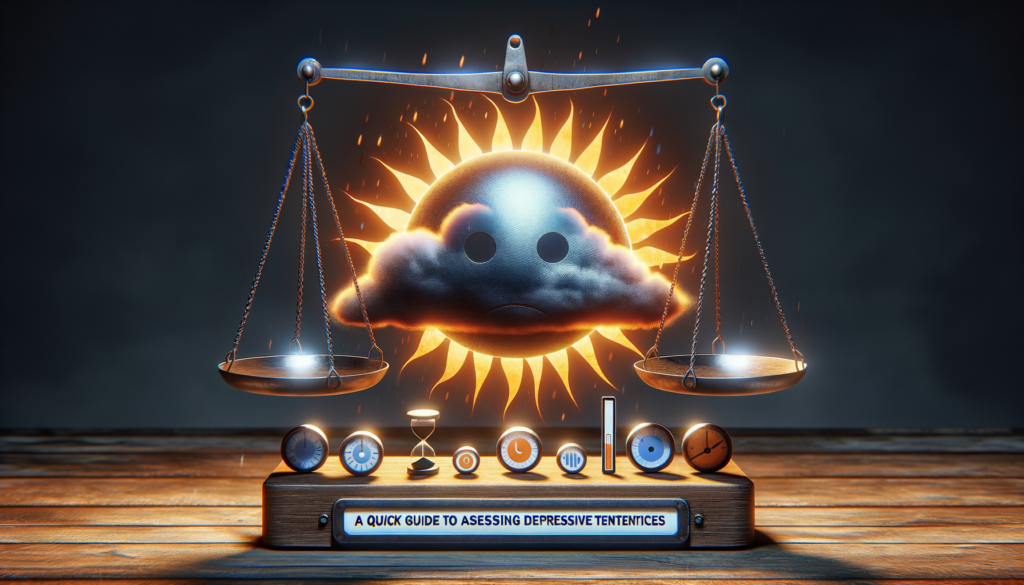The Gaming Blog

Introduction to Depressive Tendencies
In today’s fast-paced world, mental health awareness is more important than ever. Understanding and identifying depressive tendencies is crucial for early intervention and effective management. Depression can manifest in various forms, affecting individuals differently. By recognizing the signs early, individuals can seek appropriate help and support, potentially preventing more severe consequences. This guide aims to provide insights into assessing depressive tendencies, offering valuable information for those concerned about their mental well-being or that of others.
Recognizing the Signs of Depression
Depression is not a one-size-fits-all condition; it comes with a myriad of signs and symptoms that can vary widely among individuals. Common indicators include persistent sadness, loss of interest in activities once enjoyed, and changes in appetite or sleep patterns. It’s crucial to understand that these symptoms must persist for at least two weeks to be considered part of a depressive disorder. Additionally, individuals may experience feelings of worthlessness, excessive guilt, or difficulty concentrating. Recognizing these signs early can be pivotal in addressing the issue before it escalates.
To assess depressive tendencies, consider the following:
- Changes in mood: Look for prolonged sadness or irritability.
- Behavioral changes: Noticeable withdrawal from social activities or hobbies.
- Physical symptoms: Unexplained aches, fatigue, or changes in weight.
Understanding these symptoms is the first step in seeking help, whether through self-assessment tools or professional consultation.
Tools and Methods for Self-Assessment
Self-assessment tools can be a valuable resource for individuals suspecting depressive tendencies. These tools, often available online, can provide a preliminary evaluation of one’s mental state. They typically consist of questionnaires designed to gauge mood, behavior, and cognitive patterns. While these tools are not a substitute for professional diagnosis, they can offer insights into whether further evaluation by a mental health professional might be beneficial.
Some widely recognized self-assessment tools include:
- Mood questionnaires: Assess overall emotional well-being.
- Behavioral checklists: Evaluate changes in daily activities and routines.
- Cognitive assessments: Identify patterns of negative thinking.
It’s important to approach these tools with an open mind and use them as a stepping stone toward seeking professional guidance if necessary.
The Role of Professional Diagnosis
While self-assessment tools can offer preliminary insights, a professional diagnosis is essential for accurately identifying depressive tendencies. Mental health professionals, such as psychologists or psychiatrists, utilize comprehensive evaluation methods to diagnose depression. This process often involves in-depth interviews, psychological testing, and consideration of medical history to ensure a holistic understanding of the individual’s mental health.
Professional diagnosis not only confirms the presence of depression but also helps in formulating an effective treatment plan. This may include therapy, medication, or a combination of both, tailored to the individual’s specific needs. Engaging with a professional ensures that the treatment is evidence-based and aligned with the latest research in mental health care.
Seeking Support and Treatment Options
Once depressive tendencies are identified, seeking support is a vital step toward recovery. Various treatment options are available, ranging from psychotherapy to medication. Psychotherapy, such as cognitive-behavioral therapy (CBT), is a common approach that helps individuals change negative thought patterns and behaviors. Medication, often prescribed by a psychiatrist, can also be effective, particularly for moderate to severe depression.
In addition to professional treatment, support from friends and family plays a crucial role in recovery. Encouragement and understanding from loved ones can provide the emotional backing needed during challenging times. Support groups, either in-person or online, offer a sense of community and shared experiences, which can be incredibly comforting.
Ultimately, the journey to mental wellness is personal and may require a combination of strategies. The key is to remain proactive and open to seeking help when needed.
Conclusion: Taking the First Step
Assessing depressive tendencies is a significant step in acknowledging and addressing mental health concerns. By understanding the signs, utilizing self-assessment tools, and seeking professional help, individuals can take control of their mental well-being. Remember, reaching out for support is a sign of strength, and there are numerous resources available to aid in the journey toward recovery.
Whether for yourself or a loved one, taking the first step in assessing depressive tendencies can lead to a healthier and more fulfilling life.









